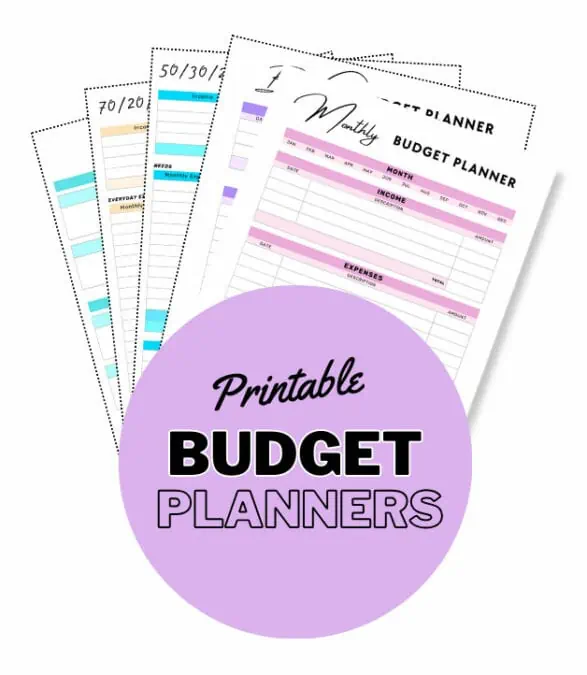Being frugal is a financial strategy wherein you adopt a mindful and practical use of resources, refrain from unnecessary spending, and make prudent use of your money.
The goal is to build wealth and achieve financial security and independence. With a frugal lifestyle, you can save a lot of money, build wealth and achieve financial security and independence earlier in life.
Explore 50 frugal living tips, how to go about them, and discover the potential savings you can attain by integrating these techniques into your daily living.
Daily Frugal Living Tips
Create a Budget
Create a budget and stick to it to keep your spending on track. Split your monthly income into essentials (50%), wants (30%) and savings (20%). Strictly prioritize the items that matter.
Pack Your Lunch
Buying lunch costs nearly $5 more per meal than bringing a packed lunch. With 260 working days a year, packing lunch rather than buying one can result in annual savings of $1,300, excluding gas and tips.
Buy Generic Brands
Generic brands are about 40% cheaper than popular brands. Many of them provide comparable quality to their more established counterparts but are cheaper since they don’t need to spend on advertising.
Stick To Your Shopping List
Creating a shopping list and sticking to it lets you save 25-30% on food expenses. The list helps you resist the urge to veer off course and buy unnecessary things.
Cook In Bulk
Cooking in large quantities, or batch cooking, adds to your savings through fewer takeout nights and less food waste. Cooking in bulk lets you store them for later and have them ready anytime.
Buy Used Items
Second-hand shopping can help you save between 25% and 50% per item. Whether these are clothing, small appliances or sporting goods, buying second-hand items can help you save up to $2,000 a year.
Be Mindful Of Your Water and Electricity Use
Turning off unused lights and appliances can save up to 30% of energy usage. Fixing leaky faucets and installing energy-efficient fixtures helps you save $350 a year in water costs.
Buy Less Things
Buying fewer things helps you avoid wasting money. Purchase only what you need and put your money towards a better purpose or add it to your savings instead.
Find Hobbies That Don’t Require Spending Money
The internet abounds with ideas on how to have fun without spending money. You can choose from hiking, volunteering, singing, biking, photography, scrapbooking important events or holding movie marathons.
Cook At Home
Instead of ordering takeout staples or having them delivered to your home, consider cooking these same items at home and get savings of up to 120% or over $1,400 a year.
Use Less Laundry Detergent
Use only a tablespoon of laundry detergent for every regular load size to save on detergent. If you use a third of a scoop of laundry detergent, it will last three times longer.
Take Care of Your Things
This is an unusual frugal tip, but caring for your possessions will make them last longer, causing you to spend less on purchasing new things. Create a list and keep a schedule for things needing maintenance.
Stop Buying Convenience Foods
Convenience foods are more expensive and less healthy than buying fresh ingredients and preparing your sandwich from scratch. Preparing the food yourself requires time and effort, but you ultimately get significant savings.
Drink Water
The cost of sodas, bottled juices and sports drinks add up over time. Choosing water over calorie- and sugar-laden drinks helps you save money and prevent costly health issues in the future.
Check Out Coupons
Stretch your supermarket budget using coupons or combining them with sales for more savings. For example, use a store coupon with a manufacturer’s coupon for a combined discount.
Carpool or Ride the Bus
Carpooling allows you to share the cost of fuel, parking and maintenance with other passengers. Riding the bus, especially using transit passes, is also more cost-effective than driving.
Commute by Bike
Using your bike to commute results in various financial savings, from fuel costs to parking fees, vehicle maintenance, insurance costs, and healthcare expenses down the road.
Extreme Frugal Tips
Stretch Your Soaps
Dilute bar soap into liquid soap. When washing dishes, fill your sink with soapy dishwater instead of using a squirt of dishwashing soap for every dish.
Only Use Cash
Extreme frugal living includes using cash to control your spending. It also avoids impulsive buying, debt accumulation, and incurring fees and interest charges related to credit or debit card transactions.
Make Your Own Cleaning Products
DIY cleaning products cost less than $1 to make. Store-bought ones can cost $5-$10 per bottle. Find recipes for homemade cleaners here.
Learn to Sew
Repair damaged clothing instead of discarding them and buying new ones. Make your own clothing and accessories and transform old clothes into new ones by upcycling.
Make Homemade Gifts
Creating gifts is more affordable than buying gifts from stores, which typically come with markups and retail overhead that drive their prices upward.
Turn Your Water Heater Lower
Lowering the temperature of your water heater prevents standby heat losses of up to $61 annually. The lower temperature helps you realize savings of more than $400.
Don’t Use Paper Towels Or Napkins
Use cloth paper towels or washcloths instead of store-bought paper towels or napkins. If you use $2/roll of paper towels, you get savings of $220 yearly when you shift to washcloths.
Hand Wash the Dishes
Use a tub or, if you have a double sink, one side of the sink for washing the dishes and the other for rinsing. Do not leave the water running.
Change Your Lightbulbs
Switching from lightbulbs to LED lights lets you save an average of around $225 in annual energy costs. LED lights are designed to save energy and reduce lighting bills.
Stop Using Your Credit Card
Interest rates on credit cards are high, making purchases more expensive if you miss monthly payments. When you stop using your card, you avoid interest charges, incurring debt, impulse spending, and annual fees.
Cancel Your Subscriptions
Cancel recurring subscriptions and those that cost more than they are worth. Turn off auto renewals. Keep only the essential subscriptions or find lower-cost alternatives.
Telecommute
Telecommuting saves employees $6,000 on basic work expenses. Remote work also saves companies $11,000 a year per employee who works at least three days a week.
Hit Up Thrift and Consignment Stores
Thrifting allows you to find items at costs lower than buying them brand new, saving you about $360 monthly or over $1,700 annually, according to a survey.
Buy Clothes Out of the Season
Shop for clothes at your favourite stores after a season ends. Check clearance racks for off-season clothing. Stores significantly reduce prices around this time to get rid of old inventory.
Adopt a Minimalist Wardrobe
Having fewer but quality clothes gives you significant savings in the long run since it reduces the need to buy new ones. Consider selling the clothes you won’t be using anymore.
Quit Smoking
Smoking is expensive. If you currently smoke a pack a day and decide to quit, you save up to $2,450 annually. Plus, you avoid costly health problems later on.
Wash Your Own Car
Skip costly professional car washes and wash your car at home for a lot less than professional car wash services that cost between $10 and $200.
Become a Budgeter and Improve Your Finances
Living paycheck to paycheck? Use these printable budget planners to get your finances back on track. They will help you understand how your income is spent and make it easier to allocate funds to pay off debt, save, and invest. These planners take the chore out of budgeting and make it so much fun!
Here’s what you get:
- 7 beautiful printables, including:
- Bi-weekly and monthly budget planners
- Financial goals trackers
- Debt snowball tracker
- 70/20/10 budget planner
- 50/30/20 budget planner
- Financial habits tracker
- Sample templates
Visit our shop to get your copies.

Frugal Living Tips From the Great Depression
Use Less Meat
Go meatless at least once a week to save cash and stretch your food budget. By using less meat, you could save almost $1,200 throughout the year.
Repurpose Old Items Into New Ones
Repurposing is a cost-effective way to avoid buying new and often expensive materials. Whether these are old clothes, rugs or product containers, find new uses for these things around the house.
Trade Items For Goods and Services
Bartering and trading allow you to get the things you need without spending cash. You likewise save money because you won’t be spending a lot on items you don’t really need.
Hang Your Laundry
Save 10-20% on utility bills by line-drying your laundry instead of using the dryer. Plus, it does not just extend the lifespan of your fabrics, but minimizes your household’s carbon footprint by 2,400 pounds yearly.
Stock Up On Sale Items
Create a stockpile when prices are low so you don’t need to pay the price in full. To save money stocking up, buy in bulk, buy on sale and buy in season.
Grow Your Food
Having your own garden reduces the amount of money you shell out for groceries. Growing food from seed helps you save $25 on grocery costs for every dollar spent.
Don’t Use Credit Cards
Credit cards make it very easy to overspend, often make purchases more expensive, get you into too much debt and can hurt your credit score when you miss payments.
Raise Animals
Among the popular frugal living tips from the Great Depression is building a homestead and growing livestock and poultry. Raise cattle for their meat and dairy and grow chickens for their meat and eggs. Provide for their sustenance by cultivating feed using locally grown plants.
Store and Preserve Produce
Once you have grown your own produce, store and preserve them so you still have them during months when it isn’t the growing season. Preserve them properly to store them longer.
Buy Whole Chicken
Purchasing a whole chicken is cheaper at around $6 or less per lb. compared to a pack of 3-lb. pre-cut chicken that costs $18 to $43 for chicken breast tenderloins. Pre-cook the meat and store it in the freezer.
Try Old-School Remedies
Try old-fashioned remedies to treat common illnesses. These are made using herbs that help treat and protect against ailments or diseases in a holistic way. Check out science-backed remedies here.
Don’t Pay for Tasks You Can Do On Your Own
Save money by doing things yourself instead of paying someone else to do it. This includes cleaning and maintaining your car, yard work, making your own cleaning products, growing your food, etc.
Buy Reusable Products Instead of Disposable Items
Reusable products save you money and lead to less waste in the long run. Swap disposable paper towels, plastic water bottles, razors, diapers and toiletries with reusable alternatives.
Learn DIY and Simple Home Repairs
DIY home repairs can help you attain significant savings, up to 83% on similar contractor work. Rec room and bathroom addition/renovation DIY projects save the most because of their higher labour costs.
Hang Clothes to Dry
Lower your gas or electric bill by 10-20% by line-drying your clothes. According to the Environmental Protection Agency, the clothes dryer is the biggest energy hog among household appliances, consuming more electricity than the average refrigerator.
Turn Old Clothes Into Quilts or Rags
Repurposing old clothes saves you money using materials you already have instead of buying new fabrics. It also minimizes waste, causes less pollution and conserves resources.
Is Frugal Living Worth It?
Yes, because it does not just help you save money but also trains you to develop healthier habits, such as mindful spending, keeping fit, becoming more disciplined with your lifestyle and adopting daily frugal living.
FAQs
Live a simple and economical lifestyle, saving when you can, rather than being unwilling to spend money even on necessary things. When shopping, find inexpensive but quality items rather than the cheapest product.
These include using your resources wisely, choosing quality over quantity, accounting for every penny, creating a budget and sticking to it, having a meal plan, preparing food from scratch, displaying restraint and living a simple, non-luxurious lifestyle.
They can have frugal habits and prioritize value over everything. Part of their financial strategy is to adopt prudent practices, such as spending smartly, living a moderate lifestyle, saving and investing, budgeting, and educating themselves about personal finances and investments.
Related:



